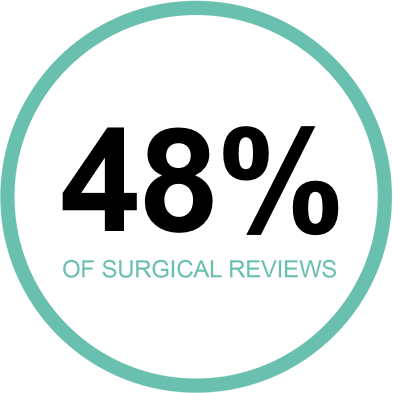Clinical audits
In 48 out of 100 reviews, the quality of audit practice was identified as an area for improvement.
Clinical audit underpins an effective surgical service. When deployed efficiently, it is a valuable process for assuring the quality of individual surgical practice, and a service’s clinical outcomes. It can also provide a key starting point for driving quality improvement.
Evidence from invited reviews shows that the quality of audit undertaken by surgical services is variable. Furthermore, when a service is struggling, the level of clinical audit can be poor. Problems become acute when an individual or service’s outcomes are questioned and there is no reliable data to demonstrate quality and safety.
Examples of inadequate audit reveal that problems occur when:
- The approach to audit has evolved around an individual’s personal interests rather than the needs of the service and its improvement.
- The approach to audit has developed around helping individual trainees meet curriculum requirements rather than patient or service needs.
- There is a lack of functioning real time data collection systems.
- There is a lack of timely and accurate entry of data into existing systems.
- There is a lack of dedicated clinical and non-clinical staff resources and time to support data collection, analysis and reporting.
- There is a lack of local expertise in managing responses to divergence – ie situations where individual or team practice appears to be diverging from expectations of 'normal' surgical outcomes.
Responses in this situation polarise around extremes. The surgeon or surgeons are not managed closely enough, or managed too closely with disproportionate action taken.
- Within a service, audit exists independently from the need for quality improvement. For example, an obscure area of surgical practice is examined, while much more significant areas of practice that have a far greater impact on patient safety are ignored.
- Audit is sidelined by senior management and regarded as low priority rather than being fundamental to a successful surgical service.
Robust clinical audit is vital if a service is to maximise its potential and demonstrate that it achieves safe, high-quality outcomes.
Surgical services should invest in their audit processes and regularly review their data. Results can then be used as an impetus to improve the calibre of care.

